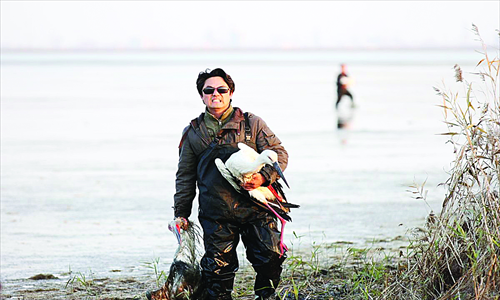Rush to rescue poisoned storks

Animal welfare volunteers from Beijing say that they suspect poison in the deaths of several oriental white storks at Beidagang Reservoir in Tianjin.
The volunteers and local police came together Sunday and Monday to try to save the storks, which are listed as first-class national protected animals in China.
Nine storks died, along with ducks and fish, and a number of others are severely ill. Local police and the forestry bureau are investigating the circumstances, although at present the cause of the deaths is not known.
Liu Huili, director of the Wild Birds and Animal Office of Nature University, an animal welfare NGO, told the Global Times that some local bird protection volunteers said they had seen a white stork retching and in distress at Beidagang Reservoir, in Tianjin's Dagang district on Sunday.
When Liu arrived at the spot Sunday, there were 26 white storks exhibiting symptoms of poisoning. They could be observed from only 50 meters away, which is unusual, said Liu, as storks cannot normally be approached so closely.
"Some storks were just in the shallow water before we brought them on to dry land. We recovered 16 storks on Sunday," she said.
The storks were treated at a local animal aid station, with gastric lavages and injections with an antidote.
"The reservoir is not polluted since we could not find any outlets for polluted water. Pesticides might allegedly be the cause, since we did find several pesticide bags containing carbofuran scattered in the area," said Liu.
Wang Zhenying, director of the Agricultural Insect Research Office of the Plant Protection Department of the China Academy of Agricultural Sciences told the Global Times that carbofuran is a highly toxic pesticide, and its use has now been restricted in farming for its negative impacts to crops, the environment and to humans.
The US Environmental Protection Agency banned its use in all areas in 2011 for safety reasons, according to its website.
Kang Dalu, the project officer of the Fauna and Flora International Beijing Office, an international conservation charity, told the Global Times that when he arrived at the reservoir on Sunday evening, he worked along with other local volunteers for nearly 24 hours straight.
Twelve storks were sent to the local animal shelter and their lives are no longer in danger, he said.
"There are several birds still in the reservoir. They couldn't be approached as they were heavily poisoned. They are being supervised by local volunteers in case their condition gets worse," said Kang.
The volunteers fear they could yet discover more poisoned storks.
"We only focused on one part of this 152-square-kilometer reservoir," Liu said.
Storks were not the only victims of the unknown toxins, as dead fish and ducks were also found in the reservoir.
"But until the local police finish their investigation, we can't tell what is the exact cause of death," Kang said.
When the Global Times reached the administration office of Tianjin Beidagang Reservoir Monday, an anonymous employee said that he only heard about the animal deaths on Monday.
"This incident of wild animals being poisoned is the first of its kind at our reservoir," he said.
The water in the reservoir is recycled, and is a source of drinking water for Tianjin, and used for irrigation, industry and flood control.
It is also an important stop for migrating birds from the north in the wintertime.
Liu alleged that illegal hunters may have poisoned the birds deliberately.
"They might sell them to restaurants to make money," she said.
The public security bureau of Tianjin confirmed the incident to the Global Times and said they are working on the investigation Monday. They would not comment in detail.
The white stork, as a first-class national protected wild animal in China, numbers fewer than 3,000, the Beijing News reported Monday.
According to the Chinese Wildlife Conservation Law, killing first- and second-class national protected wild animals means a sentence of five to over 10 years in jail, depending on the severity of the situation.